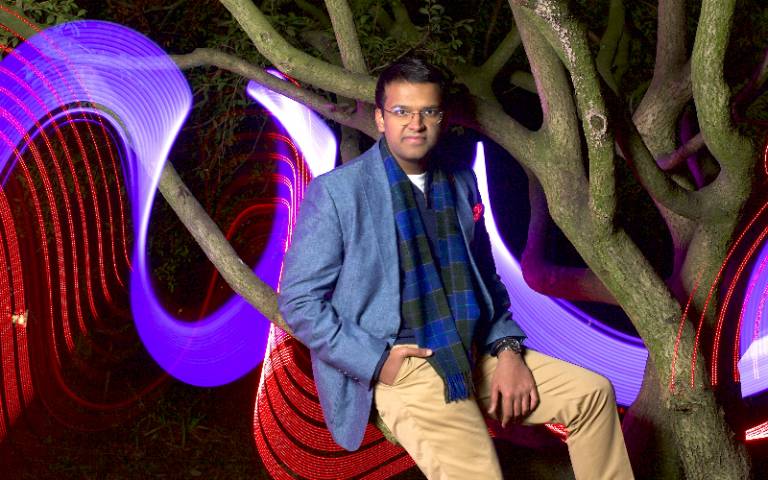Glass recycling entrepreneur named in Forbes India “30 Under 30”
9 February 2023
A UCL undergraduate, who set up a company turning glass into sand, has been named to Forbes India’s “30 Under 30” list highlighting the country’s most innovative and influential young people.

The youngest on the 2023 list, UCL School of Management student Udit Singhal is the founder of Glass2Sand, an initiative to convert glass waste into building material.
“I am extremely humbled, more so to be the youngest in this cohort at age 21,” Singhal said. “This honour strengthens my resolve to amplify the sustainability impact I can create, to leave the world better than I found it.”
Glass is highly recyclable and reusable, but unless it’s properly sorted and handled, it often winds up in landfills where it can take up to a million years to decompose. The situation is unsustainable as the world is running short of landfill space. At the same time, sand is the most extracted resource from the Earth after water, creating a significant carbon footprint.
Singhal saw the potential to turn a global problem into a business opportunity right at his doorstep. Growing up in New Delhi, he noticed that kabadis, the city’s informal waste collectors, no longer gathered glass bottles to take to the recycling centre. Demand for the material was too low and the high transport costs and space requirements to sort the glass were too great.
A better solution was needed, and at age 16, Singhal founded Glass2Sand to divert disposable glass bottles on their way to the landfill, to become commercial-grade, fine silica sand.
In 2019, Singhal imported his first processing machine, which hammered glass bottles into a fine, rounded dust, safe to use in sustainable construction projects. The purchase was assisted by a grant from the New Zealand High Commissioner in India. After launching his business, he commissioned the development of a new, improved machine that cut the bottles and which could be produced in India, cutting out the carbon footprint of importing the machines from overseas.
“A new crushing machine based on a cutting technology made in India is the core of the Glass2Sand module,” Singhal said. “The project is modular and easily scalable and can be adopted by any like-minded organisation. It is plugging the major gap identified in the recycling of such materials.”
After the business’s initial success, he found that he needed further education to expand it and take it to the next level, and enrolled at the UCL School of Management in autumn 2020.
“My course (BSc Management Science) and my time at UCL, working within its different sustainability initiatives, have offered me valuable insights that have helped me upgrade Glass2Sand’s use of technology and better understand problem-solving frameworks which have resulted in allowing me to streamline processes,” Singhal said.
Moving to the UK to pursue his degree helped prepare him for his business’s most unexpected challenge as well, the global pandemic. The initial Covid-19 lockdowns ground glass collection and crushing to a halt. But as the world slowly opened back up again, his business was able to restart quickly and safely because of his earlier efforts to stay connected from abroad.
“Knowing that I was going to leave Delhi for university in the UK, I worked on creating remote access mechanisms to make sure operations run smoothly,” Singhal said. “The advancement of technology and interconnected systems have made it possible for me to be looped into all communications related to Glass2Sand. Regular update meetings are held to ensure everything is in check. This is why I could still achieve the project goals despite Covid.”
During this time, he was selected as one of the United Nations’ 2020 class of Young Leaders for the Sustainable Development Goals. The cohort’s youngest member, and the only one from India, it afforded him a prominent platform to further highlight his work by speaking at global conferences, including a TEDx Talk, to champion solution-driven youth-led climate change.
“It was exciting that the ‘virtual’ visibility of and interest in Glass2Sand continued to grow throughout Covid. This role expanded my remit to use my experiences to help galvanise and encourage the youth towards solving the world’s most pressing challenges such as sustainability and climate change.”
After five years of operation, Singhal and his 504 volunteer collectors have recycled over 65,000 glass bottles into more than 39,000 kilograms of commercial-grade sand, saving more than 270,000 kilograms of carbon.
With an eye to the future, he continues to look for opportunities to expand Glass2Sand to new markets, and promote it as a model for sustainable solutions for the glass waste around the world. Organisations from the US, the Philippines, Bermuda and throughout India have expressed interest in the business.
“Glass2Sand has been very active in building new partnerships,” Singhal said. “We are in discussion of setting up modules in new locations, within India and abroad, in locations which face a similar glass crisis.”
Links
- Glass2Sand website
- Forbes India's "30 Under 30"
- Udit Singhal's academic profile
- UCL School of Management
- UCL Faculty of Engineering Science
Photo
- Credit: Udit Singhal
Media Contact
Mike Lucibella
E: m.lucibella [at] ucl.ac.uk
 Close
Close

